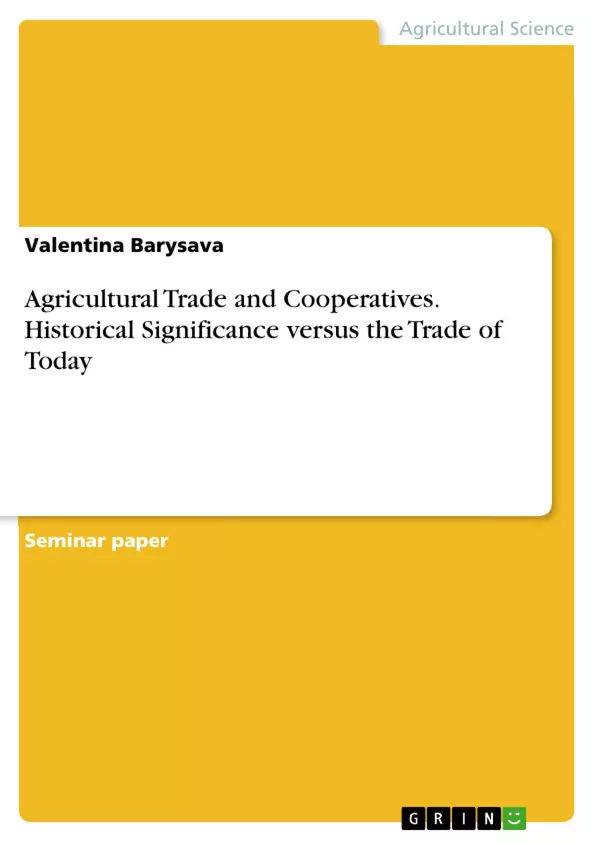This paper analyzes the importance of agricultural trade. The author first gives an overview of the historical significance and then discusses the challenges agriculture faces today. Furthermore, the paper focuses on the concentration processes in private versus cooperative agricultural trade.
Agricultural trade has an important meaning not only for the successful work of farmers, but also for the whole society and the whole economy. In the past it helped to give the farmers their seed and to buy the grain, in the same way it was important for the people who needed the grain for food. Only by the measures, how this happens, you can see the progress. In the beginning there was trade without money, only by means of exchange. The agricultural trade has promoted and developed the development of money and the market. Over the years, farmers received money for their harvest, the assortments increased and also when the first machines came, the agricultural trade had to expand to supply all the factories and people with grain and other products. Agricultural trade is active in commodity, input, feed, agricultural machinery, retail, building materials and energy trade. It creates better working and development conditions for farmers through financing, advice and support and other services.
Inhaltsverzeichnis (Table of Contents)
- Importance of agricultural trade
- Historical significance
- Tasks of the agricultural trade of today. Its importance
- The role of agricultural cooperatives
- Concentration processes in private and cooperative agricultural trade
- Conclusion
- References
Zielsetzung und Themenschwerpunkte (Objectives and Key Themes)
This term paper examines the significance of agricultural trade, tracing its historical origins and highlighting its contemporary roles. It explores the evolution of agricultural trade, the development of cooperative agricultural trade, and the challenges faced by the sector. It analyzes the impact of agricultural trade on the economy, food security, and rural communities.
- Historical development of agricultural trade
- The importance of agricultural trade in the modern world
- The role of agricultural cooperatives in trade
- The impact of agricultural trade on rural communities
- Challenges facing agricultural trade in the 21st century
Zusammenfassung der Kapitel (Chapter Summaries)
The first chapter, "Importance of agricultural trade," provides a historical overview of agricultural trade, tracing its origins back to the Bronze Age. It explores the role of agricultural trade in the development of money and markets and highlights its importance in securing food supply for the population. Chapter 1.2 focuses on the tasks and significance of agricultural trade in the present day, analyzing its diverse functions in supplying agricultural inputs, providing services to farmers, and facilitating the marketing of agricultural products. It discusses the impact of structural changes in agriculture on the role of agricultural traders and the importance of efficient agricultural practices for rural communities. Chapter 2 explores the role of agricultural cooperatives in the agricultural trade, examining their contribution to market revenues and the process of concentration in the private and cooperative agricultural trade.
Schlüsselwörter (Keywords)
Agricultural trade, historical development, food security, rural communities, cooperatives, concentration processes, challenges, economic impact, supply chain, agricultural inputs, marketing.
Frequently Asked Questions
What is the historical significance of agricultural trade?
Agricultural trade dates back to the Bronze Age and was a key driver in the development of money, markets, and the transition from barter to monetary economies.
What are the main tasks of modern agricultural trade?
Today, it involves trading commodities, seeds, feed, and machinery, while providing financing, advice, and support services to farmers.
How do agricultural cooperatives influence the market?
Cooperatives allow farmers to pool resources, increasing their market power and ensuring better conditions for buying inputs and selling grain.
What is meant by "concentration processes" in this sector?
It refers to the trend of smaller trading entities merging into larger private or cooperative organizations to increase efficiency and competitiveness.
Why is agricultural trade vital for food security?
By managing the supply chain from seed to harvest, agricultural trade ensures that food products reach the population efficiently and reliably.
- Arbeit zitieren
- Valentina Barysava (Autor:in), 2013, Agricultural Trade and Cooperatives. Historical Significance versus the Trade of Today, München, GRIN Verlag, https://www.grin.com/document/1356651



